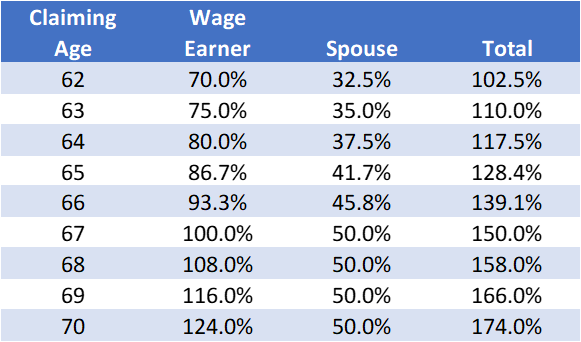I recently re-read “Get What’s Yours: The Revised Secrets to Maxing Out Your Social Security” by Laurence Kotlikoff, Philip Moeller, and Paul Solman. This book is required reading for anyone with a vested interest in the Social Security system. That means pretty much everyone. But be forewarned, it’s a dense read. And the Social Security rules can best be described as labyrinthine. Here are some key takeaways.
Stay patient
Staying patient is the most important thing to keep in mind. Many people take their benefits too soon. There are some special circumstances where claiming benefits early can make sense, but they aren’t common. The vast majority of people will be better off by deferring benefits until age 70 (or as long as they can). Take a look at the table below. If you claim benefits at age 62, you only receive 70% of your full retirement age (FRA) benefit at age 67. Spousal benefits are also reduced depending on when your spouse claims. If you wait until age 70, your benefit is 124% of your FRA benefit. Social Security pays you to wait.

(born in 1960 or later)
So why do people claim early? Often, it comes down to the difference between an investment and insurance.
Insurance, not an investment
Most people tend to look at Social Security as an investment. And this makes makes intuitive sense. You pay FICA taxes upfront when you’re working and you receive a return in the form of benefits when you retire. Pretty straightforward right? Not exactly. You have to ask yourself, “What’s the worst case scenario in retirement?” Dying early? Nope! More like outliving your money! And that is where this notion of Social Security as insurance comes in. Treating Social Security as insurance is meant to protect against that worst case of outliving your money. By deferring benefits and letting them grow, you are actually purchasing a very high-quality old age insurance policy.
So when should I claim early?
The authors do identify a few scenarios where claiming benefits early can make a lot of sense. If you are in very poor health or have a terminal disease, there’s often not much sense in waiting to collect benefits. If you are very, very rich then Social Security benefits can become negligible to your retirement income strategy, so the claiming decision carries less significance. Also, if you lack enough liquid savings for to fund living expenses, then you may be forced to take benefits early to buy food, shelter or other essentials.
But claiming benefits early in an effort to come out ahead down the road often doesn’t make a whole lot of sense.
It’s complicated
One thing that everyone agrees on… Social Security is complex. Layers upon layers upon layers of rules, caveats, and what ifs. To help with this complexity, talk to an expert or use piece of software to analyze your options (I recommend Kotlikoff’s maximizemysocialsecurity.com). Here are some common questions that require a deep understanding of the rules and an in depth analysis:
- What if I continue to work and collect Social Security?
- Can I stop/restart my benefits?
- How do spousal and survivor benefits work?
- How do I know which benefits I’m eligible for?
- What if I’m divorced?
- What happens to my benefit when I die?
Needless to say, it’s important to put some thought into how you’re going to approach the benefit claiming decision. Timing is essential to maximize your lifetime benefits, so plan ahead.
Review your statement
One great thing you can do now is to review your Social Security statement on a regular basis. This applies to young folks as well as old. Download your statement directly from the Social Security Administration website (www.ssa.gov). Check the accuracy of your earnings record and fix any errors as soon as possible.
Mechanics of claiming
Some of the best advice in the book comes down to the mechanics of claiming your benefits. You can deal with Social Security either online, on the phone, or in person. However you interact with them, please be sure to do the following:
- If going in person, try to make an appointment
- Be crystal clear about when you want your benefits to start and note it on your application
- Note any benefits you want to exclude on your application (i.e. exclude your own if applying for spousal benefits)
- Get a dated copy of your application and keep it in a safe place

